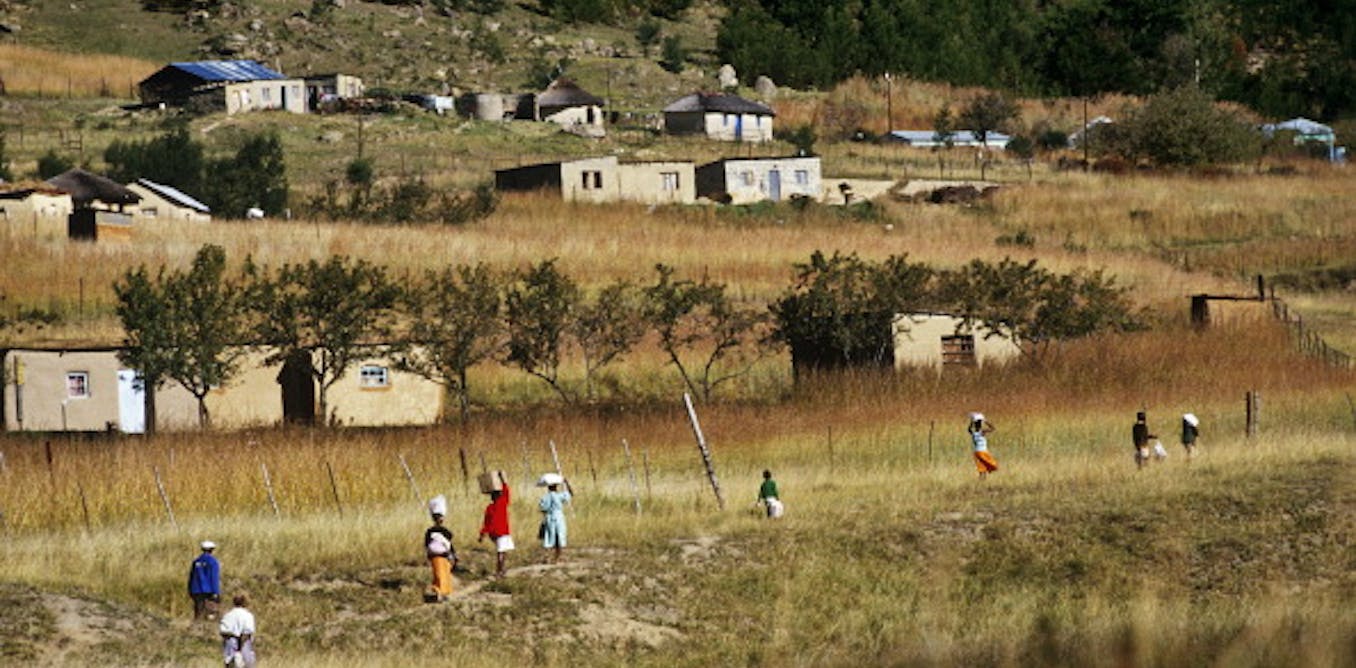[ad_1]
The current fallout between the Zulu king, Misuzulu, and his now late conventional prime minister, Mangosuthu Buthelezi, over the working of the Ingonyama Belief highlights a pervasive downside in South Africa: insecure land tenure in rural areas.
The Ingonyama Belief administers a few third of the land in KwaZulu-Natal province. Buthelezi insinuated that the king – or these round him – wished to corruptly promote the land for revenue. He additionally questioned the competence of the board chairperson appointed by the king. The king denied the cost, saying the board would “by no means permit the sale of the land”.
However the legally questionable practices of the Ingonyama Belief, akin to charging folks hire on land they personal communally, and its unilateral decision-making about communally owned land, mirror the insecurity of land tenure for hundreds of thousands of rural South Africans.
Land disputes come up when the rules on the core of customary legislation are breached. The breach could be by the state or by the representatives appointed by the communities to handle or administer the land on their behalf and for his or her collective profit.
Constitutional land reform measures are meant to supply safety of land tenure to all land holders equally. All legal guidelines, together with customary legislation, are topic to the structure. Any legislation, rule or conduct discovered to be inconsistent with constitutional rules of human dignity, equality and freedom is invalid.
In areas run by conventional leaders, land is owned collectively, consistent with customary legislation. South African legislation recognises the applying of residing customary legislation, in accordance with the structure.
Customary communal land tenure comes with inherent rights for land holders. They embody collective possession rights, equal profit from the land and pure sources, and decision-making authority.
Learn extra:
Customary land governance holds in Ghana. However occasions are altering and never for the higher
My analysis areas embody problems with rural land tenure, custodianship and property legislation.
For my part, the Ingonyama Belief has misconstrued customary communal land tenure. Its twin utility of each belief legislation and conventional customary legislation causes confusion. It’s not clear what the property rights of communal land holders are. Making use of each units of legal guidelines additionally blurs the constraints on the powers of the belief and conventional representatives.
Such misconstructions of customary legislation are sometimes intertwined with corrupt practices and energy mongering. These misconstructions protect sure people’ powers and pursuits on the expense of the better neighborhood. This happens when understandings of particular person non-public property possession are utilized to customary communal land tenure in a approach that diminishes the necessity for communal consent and session.
Dwelling customary legislation – which is developed over time by the neighborhood, is particular to that neighborhood, and happens via collective follow and decision-making in accordance with shared values and guidelines – is then supplanted by misapplications. These misconstructions can originate from varied sources, akin to statutory rules, distorted frequent legislation beliefs, and patriarchal conventional management practices that masquerade as customary legislation.
The result’s insecure tenure for rural land occupants. The Ingonyama Belief epitomises these issues.
How customary communal land tenure works
Customary communal land tenure is present in communities which have a genealogical or ancestral connection to that land. Some are beneficiaries of the federal government’s land restitution programme. They collectively maintain all property rights to their land.
Dwelling customary legislation offers them, collectively, the ability to carry particular person neighborhood members and leaders or representatives accountable for breaches of their fiduciary duties to the neighborhood.
Usually a statutory entity is created, akin to a belief or affiliation, that regulates the best way the land is managed. For instance, some communities within the land restitution programme are members of an affiliation when it comes to the Communal Property Associations Act.
Such communities elect representatives who handle the administration of the affiliation and have fiduciary duties when it comes to the act. Associations are ruled by their structure and the Communal Property Associations Act. Equally, the Ingonyama Belief is ruled by conventional customary legislation and the statutory belief framework.
Learn extra:
Customary and spiritual legal guidelines are impeding progress in the direction of girls’s well being in Nigeria
Each types of communal land holding are distinguishable from non-public property possession, which confers registered possession rights on people. Personal possession is primarily ruled by the frequent legislation. It offers the land proprietor autonomous decision-making powers with few limitations. The proprietor has intensive unilateral decision-making authority in respect of their privately owned land. They will, for instance, switch possession, get rid of, or encumber their property (with out session).
The Ingonyama Belief and its tenure challenges
The Ingonyama Belief was established in 1994 by the then KwaZulu Authorities to manage all land it held. It’s a company entity and administers 2.8 million hectares of the land in KwaZulu-Natal. The territory was as soon as administered by the erstwhile KwaZulu homeland. This adopted a deal hammered out earlier to entice Buthelezi and his Inkatha Freedom Get together to participate within the elections that ended apartheid. The province is a stronghold of the celebration.
The Zulu monarch is the only real trustee, though the land is owned by the Zulu folks. The king represents the folks and the land have to be managed for his or her profit and welfare.
The belief is plagued with disputes for not involving the neighborhood in its enterprise transactions. There was little proof of collective profit for the neighborhood.
The disputes expose unequal revenue from belief belongings, privileging a choose few, as a substitute of all of the communal land holders equally. To sum up crisply: the belief has handled communal land like privately owned land.
Learn extra:
Why South African neighborhood’s win in opposition to mining firm issues
In 2022, the Supreme Court docket of Enchantment directed the Ingonyama Belief to stop letting belief land to the land beneficiaries to whom the land belonged. It was ordered to repay the hire.
In 2017, a panel appointed by parliament to assessment post-apartheid laws beneficial that the belief be amended or repealed.
Nonetheless, such criticism is perceived by some as a slight in opposition to the king and is met with social and political resistance. The Congress of Conventional Leaders of South Africa contends that the Ingonyama Belief can’t be repealed, amended or dissolved with out the king’s approval – in accordance with customary legislation.
Conventional rule versus democracy
The misapplication of tenure below the Ingonyama Belief exemplifies structural battle between belief tenure and customary conventional rule.
The belief applies a type of conventional despotic rule that may be at odds with democratic rules enshrined within the structure. Beneath conventional despotic rule or authoritarian rule, customary legislation is interpreted in a approach that naturally limits the necessity for neighborhood session, consent and participation in all decision-making associated to the land from the “topics”.
Learn extra:
South Africa’s courts and lawmakers have failed the best of cultural range
This despotic rule can also be at odds with belief tenure and the communal landholding rights of rural communities. The extent to which the neighborhood is ready to equally use and revel in their land, and the financial advantages accruing from it for collective social and financial progress, must be the yardstick in opposition to which communal land tenure is measured, and land rights clarified and guarded.


